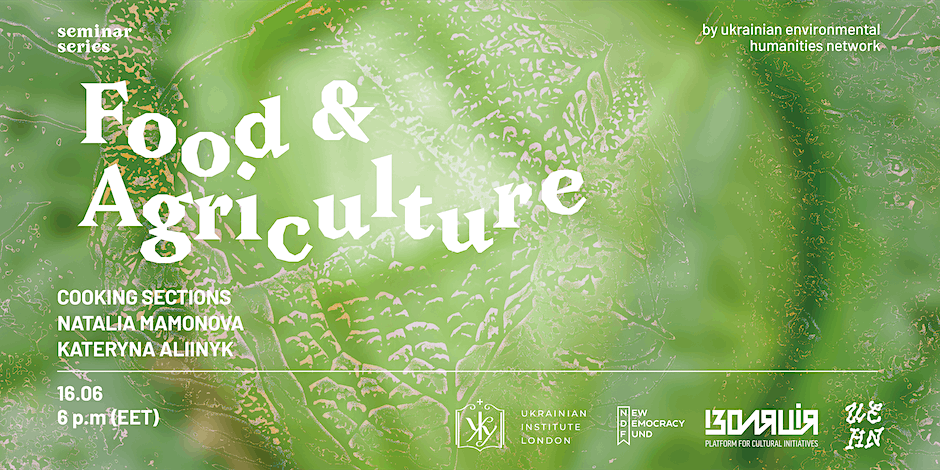Food & Agriculture

In the second seminar, it was considered Ukraine’s reputation as the ‘bread basket of Europe’ and focused on human-land relations during Russia's war. It was joined by Natalia Mamonova, Kateryna Alyinyk, and Cooking Sections.
Food sovereignty and solidarity initiatives in rural Ukraine during the war
In her talk, Natalia Mamonova discussed coping strategies and solidarity initiatives in rural Ukraine during the full-scale war with Russia. Based on primary qualitative data conducted remotely, she discussed the ability of different food producers to farm in military conditions, their mutual help and reciprocity. Natalia also talked about farmers’ mundane patriotism, the influx of internally displaced persons to the countryside, charitable initiatives of agribusiness, and local conflicts and tensions. She argued that the networks and collective action that emerged during the war accelerated the development of a vibrant rural civil society needed to promote peasant rights and endorse food sovereignty in Ukraine.
Natalia Mamonova is a Senior Researcher at RURALIS — Institute for Rural and Regional Research, Norway. Her research focuses on rural politics, agrarian transformation, social movements, food sovereignty and right-wing populism in post-socialist rural Europe. She received her PhD degree from Erasmus University, in the Netherlands in 2016. Since then, she has been a researcher/lecturer at the University of Oxford, the New Europe College in Bucharest, the University of Helsinki, and the Stockholm Centre for Eastern European Studies. Her current research at RURALIS is primarily focused on the impact of the war in Ukraine on the Ukrainian and global food systems.
«What was planted? What has sprouted?»
This presentation considered the impact the war is having on domestic chores, how land is viewed, and on soil and food during nine years of occupation. How has gardening become a symbolic gesture of resistance from communities who are on the other side of the “border” still waiting for liberation and the produce of garden labour became a sacred souvenir?
Kateryna Aliinyk was born in 1998 in Luhansk, Ukraine. Since 2016, she lives and works in Kyiv. Her main mediums are painting and text. She mostly works with themes of war and the occupation of Donbas through images of nature and non-anthropocentric optics. In 2021, Aliinyk graduated from the National Academy of Fine Arts and Architecture with a master's degree in painting. In 2020, she completed a course at KAMA, majoring in contemporary art and a course entitled Method Fund "Positions of Artists". She has participated in the following exhibitions: “What is depicted here?” (2022), “A:2402 D:2022” (2022), “If there is no war today, it doesn’t mean there is no war” (2022), “Working room” (2022), "State of emergence” (2022), “Heart of Earth” (2022).
CLIMAVORE: A Season of Exhausted Soil
Monoculture farming and overuse of chemical fertilisers have turned the ground and waterways infertile. Sifting through historic Trypillian cultures to the contemporary financialization of chernozem soil, CLIMAVORE proposes foodways for nourishing both the ground and our bodies.
Cooking Sections examines the systems that organise the world through food. Using site-responsive installation, performance and video, they explore the overlapping boundaries between art, architecture, ecology and geopolitics. Established in London in 2013 by Daniel Fernández Pascual and Alon Schwabe, their practice uses food as a lens and a tool to observe landscapes in transformation. They have worked on multiple iterations of the long-term site-responsive CLIMAVORE project since 2015, exploring how to eat as humans change climates. In 2016 they opened The Empire Remains Shop. Their work has been exhibited at Tate Britain, Serpentine Galleries, SALT, Bonniers Konsthall, Lafayette Anticipations, Grand Union, Royal Botanic Garden Edinburgh, Atlas Arts, HKW, SPACES, Storefront for Art and Architecture; the Taipei Biennial, 58th Venice Biennale, Istanbul Biennial, Cleveland Triennial, BAS9, Shanghai Biennial, Los Angeles Public Art Triennial, Sharjah Architecture Triennial, Sharjah Art Biennial, Performa17, Manifesta12, and New Orleans Triennial among others. They have been residents at Headlands Center for the Arts, California; Fogo Island Arts; and The Politics of Food at Delfina Foundation, London. They were guest professors at the Academy of Fine Arts, Munich in 2020—2021. They are Senior Research Fellows and Principal Investigators at CLIMAVORE x Jameel at the Royal College of Art, London. Cooking Sections were nominated for the Turner Prize in 2021. They were awarded the Special Prize at the 2019 Future Generation Art Prize and were nominated for the Visible Award for socially engaged practices. Daniel is the recipient of the 2020 Harvard GSD Wheelwright Prize for Being Shellfish. They have published 3 books: The Empire Remains Shop (2018), Salmon: A Red Herring (2020), and Offsetted (2022).
The Ukrainian Environmental Humanities Network was launched in 2022 by Dmytro Chepurnyi, Karolina Uskakovych, Jonathon Turnbull, Oleksandra Pogrebnyak, and Ewa Sułek. The network brings together scholars, researchers, artists, curators, designers, scientists, and more who are interested in Ukraine's more-than-human landscapes and ecologies.
The project is implemented with support from the New Democracy Fund implemented by the Danish Cultural Institute.